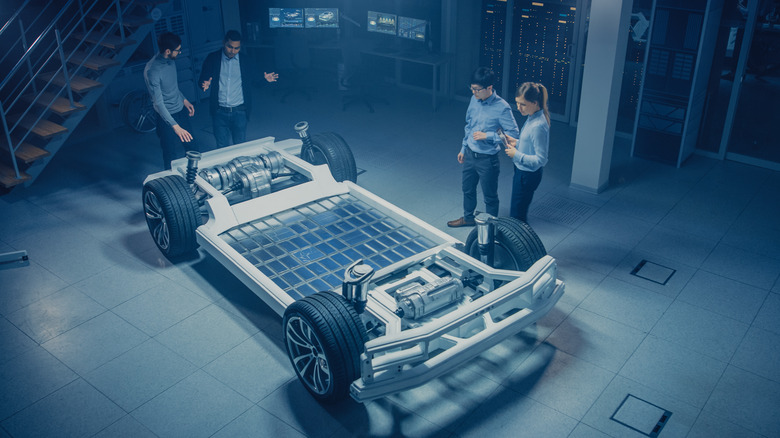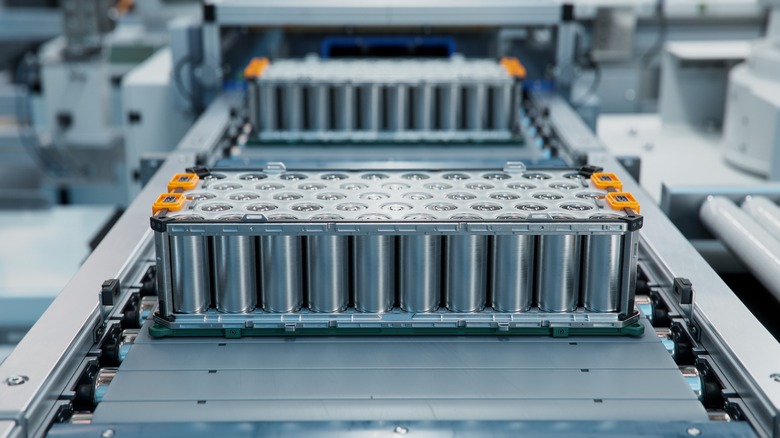Expert Predicts Game-Changing Breakthrough For EVs In The Next 3-5 Years
Despite being the world's second-largest market for electric vehicles (EVs), cars powered by internal combustion engines (ICE cars) continue to dominate the sales charts in the U.S. As of February 2024, only 6.5% of new cars sold in the country were electric vehicles — compared to 83.1% which were gas-powered, according to Edmunds. While there is no denying that EVs have become popular over the years, several factors continue to inhibit the growth of EVs in most markets around the world. These factors include range anxiety, concerns over battery charging speeds, and questions about the actual overall cost of ownership for EVs.
It goes without saying that EV companies are constantly on the lookout for ways to get around these key problem areas. Solving these problems could jump-start the adoption rate of EVs and help spur a rise in EV ownership up to 40% of new car sales by 2030, as predicted by U.S. Bureau of Labor Statistics. Most EV companies are pinning their hopes on revolutionary improvements to battery technology to solve most of the issues preventing wider EV adoption.
This sentiment is shared by Dr. Laine Mears, Automotive Manufacturing Chair at Clemson University International Center for Automotive Research (CU-ICAR). Dr. Mears has decades of experience in the automotive industry and has also spent years working at several automotive companies. We recently asked Dr. Mears what he thought would be some of the biggest breakthroughs that potential EV buyers can expect within the next few years.
EV batteries hold the key
In contrast to ICE vehicles, where the most crucial component is arguably the engine, things aren't quite the same when it comes to EVs. The most crucial component inside modern-day EVs continues to be the battery. Before the arrival of mainstream EVs, research and development in this field had slowed. That is no longer the case in 2024, thanks to the ever-increasing demand for EVs. Today, there is constant pressure on EV car makers to innovate and improve battery technology or be at risk of being overtaken by rivals. As a result, there has been a massive increase in the number of people researching to improve battery technology.
With multiple companies and their R&D teams continuing to make large-scale efforts to improve battery tech, it wouldn't come as a surprise if we end up witnessing major battery-related breakthroughs in the next few years. According to Dr. Mears, "There are a number of large efforts in researching alternative battery designs that will give longer range, longer life, and more consistent performance across environments." He goes on to say, "I see a breakthrough battery technology in the next 3–5 years that will be better performing, more sustainable, and lighter weight." He also predicts the arrival of advanced battery management systems that would make the entire system way more efficient than things are today.
Some of these efforts have already paid off. It is not uncommon for a modern-day commercial EV battery to have excellent energy density figures, often surpassing the 700 Wh/L (watt-hours per liter) mark, a number that was under 100 Wh/L back in 2008. Companies are already working on batteries that will exceed the 1,000 Wh/L mark in the near future.
New battery technologies to look out for
Most modern-day EVs are dependent on lithium-ion batteries to power their electric motors. This battery tech has been around for a long time now, and while they have seen major improvements, there are inherent issues with lithium batteries as well. To begin with, the manufacturing of these batteries involves the mining of several toxic materials. Li-ion batteries also tend to overheat and degrade in performance when exposed to higher temperatures. These batteries have also been in the news for their tendency to catch fire, thanks to a phenomenon called thermal runaway, which basically is an uncontrolled fire that is difficult to extinguish once set off.
Massive efforts in the development of better, more sustainable battery technology have led to the arrival of several new battery types. Some of the more notable ones include lithium-sulfur batteries, solid-state batteries, and sodium-ion batteries.
For those wondering, lithium-sulfur batteries are more energy-dense and, therefore, can offer a greater range than lithium-ion batteries. However, they are still being developed and aren't commercially viable for large-scale manufacturing. As for solid-state batteries, these are still in their early developmental stages but should eventually result in more energy-dense, sustainable batteries. Efforts are underway to develop sodium-ion batteries, albeit in a nascent stage.


